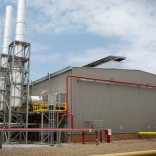Mozambique inks US$6 million contract-programme with Japan on professional training
Making a difference: Architect, environmental activist and hands-on entrepreneur Sebastião Coana

Noticias / Sebastião Coana at work
Production of firewood and charcoal for domestic energy contributes greatly to deforestation and has environmental impact all over the world, including global warming and the extinction of fauna and flora species due to loss of habitat.
It is estimated at about 85 percent the population of Mozambique uses coal and other wood-based fuels to prepare meals and heat water.
As a means to reduce the indiscriminate felling of trees for timber and charcoal, an entrepreneurial initiative is about to roll out in Manhiça, Maputo province, with the aim of building three ecological coal plants in the centre, south and north of the country within 10 years.

Started in 2015 by Sebastian Coana, born 27 years ago in Palmeira administrative post, at that point in Maputo province, the creator of “ecocarvão” (eco-coal) says that the dream began in China, where he has been studying for the last 10 years.
Despite having a bachelor’s degrees in architecture and design and a masters in finance, Coana says he prefers to invest his energies in this project since the defence of the environment has always been among his priorities.
Noticias found him in his factory in Manhiça district, a small development where he and 12 other community members are working.
“To contribute to mitigating the effects of climate change caused to a great extent by deforestation and emission of greenhouse gases such as carbon dioxide has always been my priority, especially in a country where the power source for many families is coal,” he says.
Coana told us that initially he produced coal from paper collected in the dumps, but because the initiative was not accepted in the market, he decided to use other raw materials.
Currently he uses coconut shell collected in Inhambane province, which is transformed into activated carbon, a substance obtained from its burning. This substance is then ground and mixed with wheat husks and molded into briquettes, which after seven days are ready to use in the kitchen, pressing irons, aviaries and other applications.
Initially, a 4-kg bag of his fuel cost 198 meticais. It now sells for 98 meticais, and the aim is to bring that down to 50 meticais so more people will have access.
To increase production and expand his initiative, Coana has recently imported from China a new milling press which can increase production levels from the current 240 to two thousand bags per week.
Coana is directly involved in the manufacturing process, which is key to the success of his business, already supplying the Manhiça district and Maputo and Matola cities. Currently, his greatest challenge is to expand his ‘eco-coal’ distribution network.

Clean energy
According to Coana, population increase is a major cause of deforestation , and has resulted in disorderly logging and forest destruction.
“People fell trees for various reasons, but never remember to plant another so that in the future they may again have access to this important natural resource,” he says.
According to studies cited by Coana, about five thousand tons of charcoal are used annually in the country, which means that each person consumes 120 kg per year.
The young entrepreneur expects to produce up to one ton of charcoal per month in each of the three envisaged factories, each costing 25 million meticais. The aim is to produce clean energy on a large scale to supply the domestic market and at the same time reduce the cost of living by providing a cheap and sustainable product.
Coana warns that logging without tree replacement is a major cause of imbalance in the ecosystem and contributes to the frequent occurrence of natural disasters such as the floods and cyclical droughts in the country in recent years.
Data shows that about 219,000 hectares of native forest are lost to indiscriminate logging every year across the country.
By: Valdimiro Saquene











Leave a Reply
Be the First to Comment!
You must be logged in to post a comment.
You must be logged in to post a comment.